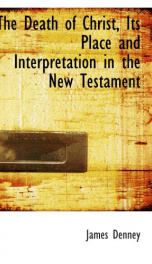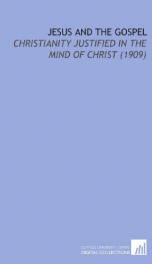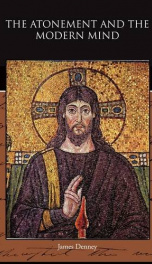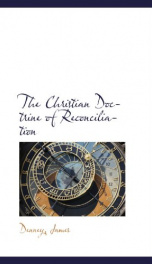Denney James

James Denney, D.D. (1856-1917) was a Scottish theologian and preacher. Denney was born in Paisley, Scotland, 5 February 1856, to Cameronian (reformed Presbyterian) parents. His father was a joiner and Cameronian deacon. In 1876 the family followed the majority of the Reformed Presbyterian Church of Scotland into union with the Free Church of Scotland. He was educated at the Highlanders' Academy, Greenock, University of Glasgow, from 1874 to 1879 and then at Free Church College, Glasgow until 1883. He won the Moral Philosophy gold medal and Blackstone Prize while at Glasgow University. He was influenced greatly by Edward Caird and Richard Jebb and briefly became a student assistant to John Veitch. Denney was an outstanding student at Free Church College, where he studied under Dr. George C.M. Douglas (Old Testament), Dr. T.M. Lindsay (Church History), Dr. James Candlish (Systematic Theology) and Dr Alexander Balmain Bruce (New Testament). Denney was greatly influenced by Professor Bruce in particular, adopting his system of apologetics. Denney said that Professor Bruce "let me see Jesus" rather than cluttering his lectures with abstruse points. While still a student Denney published his first work, Natural Law in the Spiritual World, by a Brother of the Natural Man. It was a trenchantly critical review of Henry Drummond's Natural Law in the Spiritual World. After university he turned to the Ministry. Denney was licensed to preach by the Presbytery of Greenock on 16 May 1883 and was appointed Missioner to the Hill Street Mission of St. John's (Free Church), Glasgow. In 1886 he was called to be pastor of the East Free Church, Broughty Ferry, where he succeeded his friend and mentor Professor Bruce. At Broughty Ferry Denney was a popular preacher who preached the Gospel to the common people. He married May Carmichael Brown on 1 July 1886. Their marriage was a happy one. According to William Robertson Nicoll, Denney, previously tempted away from the Evangelical and Reformed faith of his parents, was influenced to return in that direction by his wife's encouraging him to read sermons by C.H. Spurgeon. Some of his expository sermons preached at Broughty Ferry were published in two volumes of The Expositor's Bible, edited by W. Robertson Nicoll, The Epistles to the Thessalonians in 1892 and The Second Epistle to the Corinthians in 1894. (Amusingly, some copies of the commentary on the First Epistle to the Corinthians in a later edition of The Expositor's Bible have Denney's name on the covers. The book was in fact written, as the title page makes clear, by Marcus Dods). In 1893 Denney was asked to deliver a series of theological lectures at Chicago Theological Seminary. These were published in 1894 under the title Studies in Theology. Some of his statements on the nature of the Bible were objected to, but otherwise the book was recognised as an important work. Denney was also awarded the degree of Doctor of Divinity by the University of Chicago. Denney was appointed Professor of Systematic Theology at his old alma mater, Free Church College Glasgow, in 1897, and spent the rest of his life teaching there. In 1900 he transferred to Professor Bruce's old Chair of New Testament Language and Literature, which he held until his death in 1917. In 1915 he was appointed principal of the college, the first former student of the institution to receive that honour. Denney became a close friend of the one-time Free Church minister and journalist Sir William Robertson Nicoll, to whose publications he contributed liberally dozens of articles. His wife died in 1907 and Denney felt the loss deeply, from which he never recovered, writing only two major works before his death in the summer of 1917 at the comparatively early age of 61. Denney's greatest contribution to theological literature is in his robust defense of the penal character of the atonement[clarification needed]. First expressed in his Studies in Theology, it found its fullest expression in his 1902 work The Death of Christ (London, Hodder and Stoughton, often reprinted), and its follow-up (in later editions included as an appendix in The Death of Christ), The Atonement and the Modern Mind. Denney insists that the death of Christ cannot be understood unless it is seen as a death for sin, as Christ bearing the penalty in the place of those he came to save[clarification needed]. He strongly resisted any attempt to drive a wedge between the substitutionary and ethical aspects of the atonement. In his last book, published posthumously, The Christian Doctrine of Reconciliation, Denney returned to the doctrine of the atonement. In addition to his academic oeuvre, he made dozens of contributions to journals and newspapers ranging from erudite theological journals to The Morning Watch, a Sunday-school magazine edited by his friend J. P. Struthers. Denney wrote other major works. As well as those already mentioned he contributed a commentary on the Greek Text of Romans to The Expositor's Greek Testament (edited by W. R. Nicoll). His Jesus and the Gospel (London, Hodder and Stoughton, 1908) is a careful piece of theological writing demonstrating that there is no disparity between Jesus' own teaching about himself as recorded in the Gospels and the view of Jesus exhibited in the New Testament Epistles. Several of his sermons were published in 1913 under the title The Way Everlasting (London, Hodder and Stoughton).
do you like this author?
What readers are saying
What do you think? Write your own comment on this book!
write a commentWhat readers are saying
What do you think? Write your own comment on this author!
write a commentBook list

the twentieth century new testament a translation into modern english made from
Series:
Unknown
Year:
Unknown
Raiting:
5/5
Show more
add to favoritesadd In favorites

the death of christ its place and interpretation in the new testament
Series:
Unknown
Year:
Unknown
Raiting:
4.5/5
PREFACETHE subject of this book nlust not be extendedbeyond the promise of the title.I t is not an exhaustive treatise on theA tonement or on Justification: it is anexamination of the New Testament teachingon the Death of Christ.That the death of Christ has a place inthe N ev Testament vhich demands for itthe most careful consideration ,vill not bequestioned by anyone j and though theground has often been traversed, in wholeor in part, before, there are reasons whichjustify at the present time such a studyas follows. One is that, so far as thevriter can judge, the death of Christ hasnot the place assigned to it, either inpreaching or in theology, which it has inthe New Testanlent. There have beenconspicuous examples of essays and eventreatises on the Atonement. standing in r.odiscoverable relation to the New Testament.The proportions of average currentChristianity are not those of apostolicChristianity; and if the latter is in anyTable of Contents CONTENTS; INTRODUCTION; PAGE; Conception of the New Testament: its unity not; artificial, I; Misused distinctions ~ historical and dogmatic,; biblical and systematic, material and formal, 4; The death of Christ a real subject in the New; Testament, 8; Outline of study, 9; CHAPTER I; THE SYNOPTIC GOSPELS; The mind of Christ and the mind of the evangelists, II; The idea that our Lord's death must have been; foreign to His mind when He entered on His; work, II; Relation to this idea of the narratives of His Baptism; and Temptation, 13; Significance of the Baptism in particular, 18; The first suggestions of our Lord's death and; allusions to it, 22; The taking away oC the Bridegroom (Mark ii 19),; and the sign of Jonah (Mat --This text refers to an alternate Paperback edition.
Show more
add to favoritesadd In favorites
Book list

the twentieth century new testament a translation into modern english made from
Series:
Unknown
Year:
Unknown
Raiting:
5/5
Show more
add to favoritesadd In favorites

the death of christ its place and interpretation in the new testament
Series:
Unknown
Year:
Unknown
Raiting:
4.5/5
PREFACETHE subject of this book nlust not be extendedbeyond the promise of the title.I t is not an exhaustive treatise on theA tonement or on Justification: it is anexamination of the New Testament teachingon the Death of Christ.That the death of Christ has a place inthe N ev Testament vhich demands for itthe most careful consideration ,vill not bequestioned by anyone j and though theground has often been traversed, in wholeor in part, before, there are reasons whichjustify at the present time such a studyas follows. One is that, so far as thevriter can judge, the death of Christ hasnot the place assigned to it, either inpreaching or in theology, which it has inthe New Testanlent. There have beenconspicuous examples of essays and eventreatises on the Atonement. standing in r.odiscoverable relation to the New Testament.The proportions of average currentChristianity are not those of apostolicChristianity; and if the latter is in anyTable of Contents CONTENTS; INTRODUCTION; PAGE; Conception of the New Testament: its unity not; artificial, I; Misused distinctions ~ historical and dogmatic,; biblical and systematic, material and formal, 4; The death of Christ a real subject in the New; Testament, 8; Outline of study, 9; CHAPTER I; THE SYNOPTIC GOSPELS; The mind of Christ and the mind of the evangelists, II; The idea that our Lord's death must have been; foreign to His mind when He entered on His; work, II; Relation to this idea of the narratives of His Baptism; and Temptation, 13; Significance of the Baptism in particular, 18; The first suggestions of our Lord's death and; allusions to it, 22; The taking away oC the Bridegroom (Mark ii 19),; and the sign of Jonah (Mat --This text refers to an alternate Paperback edition.
Show more
add to favoritesadd In favorites

letters of principal james denney to w robertson nicoll 1893 1917
Series:
Unknown
Year:
Unknown
Raiting:
3.5/5
Show more
add to favoritesadd In favorites

jesus and the gospel christianity justified in the mind of christ
Series:
Unknown
Year:
Unknown
Raiting:
4/5
Originally published in 1909. This volume from the Cornell University Library's print collections was scanned on an APT BookScan and converted to JPG 2000 format by Kirtas Technologies. All titles scanned cover to cover and pages may include marks notations and other marginalia present in the original volume.
Show more
add to favoritesadd In favorites

The Atonement and the Modern Mind
Series:
Unknown
Year:
Unknown
Raiting:
4/5
James Denney was a Scottish theologian and preacher. Some of his expository sermons preached at Broughty Ferry were published in two volumes of The Expositor's Bible, The Epistles to the Thessalonians in 1892 and The Second Epistle to the Corinthians in 1894. He became a teacher and spent the rest of his life as a professor. Denney's greatest contribution to theological literature is in his robust defense of the penal character of the atonement. In The Atonement and the Modern Mind. Denney insists "the death of Christ cannot be understood unless it is seen as a death for sin, as Christ bearing the penalty in the place of those he came to save." He strongly resisted any attempt to drive a wedge between the substitutionary and ethical aspects of the atonement.
Show more
add to favoritesadd In favorites
What readers are saying
What do you think? Write your own comment on this author!
write a commentif you like Denney James try:
readers also enjoyed
What readers are saying
What do you think? Write your own comment on this author!
write a commentGenre
if you like Denney James try:
readers also enjoyed
Do you want to read a book that interests you? It’s EASY!
Create an account and send a request for reading to other users on the Webpage of the book!


